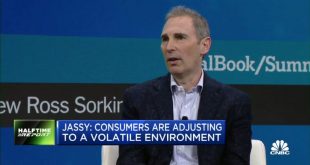No, it is not money or opportunity that makes workers the happiest. The majority of workers consider the meaning of their work to be the most significant contributor to their overall workplace happiness.
The majority of workers (35%) rank meaningfulness No. 1 in contribution to on-the-job happiness, according to the latest CNBC/SurveyMonkey Workplace Happiness poll. That is followed by salary (20%), autonomy (18%), opportunity (15%) and recognition (12%).
Age does matter, though. As workers enter different stages of life and face new responsibilities — paying off student loans, buying a car, a house, getting married and having a family — their priorities and what they value in the workplace does shift in notable ways.
NBC | NBCUniversal | Getty Images
The CNBC/SurveyMonkey online poll was conducted by SurveyMonkey from June 21–30, 2019, among a national sample of 7,940 workers in the United States. A diverse group of men and women were polled across the country, ranging in age from 18 to over 65, on the factors that contribute to overall happiness in the workplace.
“There is a life-cycle component to what people want in their jobs and what they’re prioritizing,” said Jon Cohen, chief research officer at SurveyMonkey. Important life milestones “certainly have a great effect on what workers are looking for in the workplace.”
Workers in their 20s and 30s
Twenty-four percent of college students and recent grads (18–24) starting their professional careers rank the opportunities their new job offers to advance professionally as the second most important contributor to their overall happiness, after pay. Recognition and opportunity as workplace happiness factors were highest among this age group.
Workers in their mid 20s and 30s — when financial responsibilities like student loan payments and aspirations like starting a family and buying a home are increasing — were the least likely to say meaning was most important and were most likely to cite pay as the most important factor in happiness at work.
I think caring about the meaning of your work sometimes feels like a luxury.
Andrew Challenger
vice president at Challenger, Gray & Christmas
While many studies of the youngest American generations ascribe to them a level of social awareness that surpasses that of previous generations and contributes to an expectation that careers will be meaningful, the data does not support this. Workers in the 18–24 bracket and 25–34 bracket were the least likely to cite meaningfulness of work as the key to professional satisfaction.
“I think caring about the meaning of your work sometimes feels like a luxury. Early in your life, you just need to find a job, pay off your student loans, feed your kids. Whereas later you have more of a luxury to do what you really want to do,” said Andrew Challenger, vice president at Challenger, Gray & Christmas, the oldest executive outplacement firm in the U.S.
Workers in their 40s, 50s and 60s
Autonomy becomes more significant for workers in their 40s and 50s as they begin valuing having control over their work projects and the flexibility of their schedule. About 20% of these workers rank it as the second most important factor behind pay.
While there are mounting concerns that more retirement-age Americans will need to keep working to make ends meet, the survey data does not support this need as being reflected in today’s 65+ workforce. They are the most likely to cite meaning (44%) as the basis for their workplace happiness. Only 13% of these older workers rank pay as the No. 1 factor.
Challenger said almost 90% of his clients age 50 to 60 express to him their desire to find a job where they feel they are contributing something positive to the world.
“Once you’ve made it to a certain stage of your life, maybe if you’ve made it past some milestone where you got the corner office, you have some sort of accomplishment in your background, you feel financially stable, then you have the luxury of really caring about the work you do,” he said.
The search for meaning at work
“The meaning of my work has always been my drive, professionally and personally,” said Pedro Trivella, 55, an ESL teacher from Asbury Park, New Jersey. “It was the reason I decided to switch careers in my late 40s, go back to school and get my teaching degree.”
Trivella left his job as a sales rep for American multinational conglomerate 3M after realizing his work was not making the impact he had hoped for. He says being an educator is not only his daytime job but his life mission.
“My job as an educator does not stop on Friday at 3pm,” Trivella said. “This job has allowed me to teach my community about the benefits of living in such a diverse country, the importance of being proud of your heritage and the contributions we all, as immigrants, can make to our community.”
While Trivella realizes the risk he took when he decided to leave his prior rep sales job and go back to school, he does not regret the decision.
“Teaching has allowed me to not only fulfill the American dream I had hoped to find when I moved to the United States decades ago but has given me the opportunity to help my students find theirs.”
For others, caring about the work they do is simply a luxury they cannot afford. A 32-year-old management trainee in the auto sector, who did not wish to disclose his name for fear of being identified by his employer, told CNBC that not loving his work at this stage of life is a bargain they he had no choice but to make. (The auto industry ranked last among sectors in workplace happiness, according to the survey.)
“I wish I was doing something I love, but there are just too many bills to pay at the moment. Insurance, rent, student loans, planning a wedding,” he said. “I want to enjoy waking up to go to work and not have a pit in my stomach.”
Later in life, he dreams of opening his own business.
Ultimately, “in terms of what constitutes workers’ core happiness, meaning is still the top factor,” Cohen said.
 EU News Digest Latest News & Updates
EU News Digest Latest News & Updates



